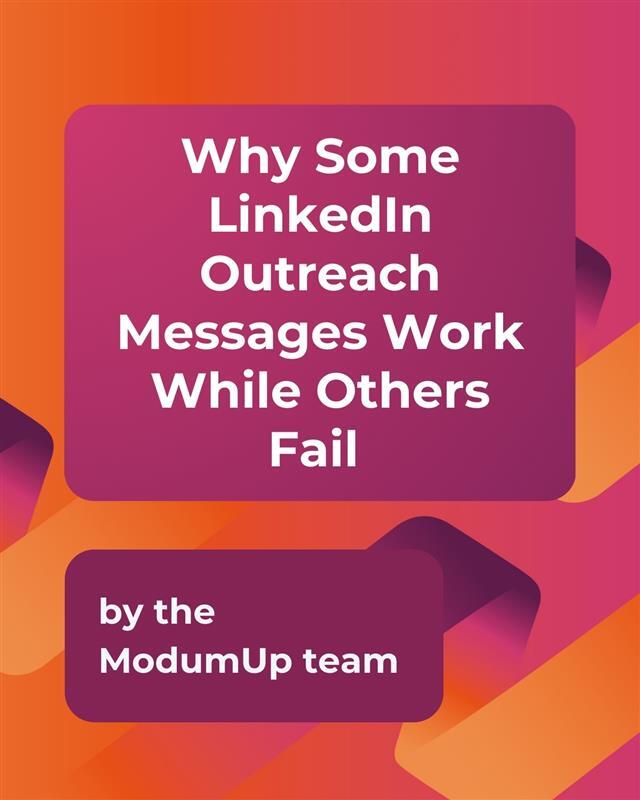Why do some LinkedIn messages get responses even without icebreakers, while others are ignored?
1. Product/Service and USP
➡️ Are you offering something unique or a common solution?
⭐ Unique offer:
- Is it easy to understand? If your product is complex, potential clients may not immediately see its value. Thought leadership content can help.
- Is there a real market need? New businesses often lack this insight — interview clients to refine your positioning.
⭐ Common offer:
- Is there high demand, or is the market oversaturated? What would make customers switch to you?
- Do you appear trustworthy compared to competitors? Strengthen your profile with case studies, client logos, and measurable results.
2. Market Factors
➡️ Are you working in your local market or expanding into a new one?
⭐ New market entry:
- Trust takes time — networking and local partnerships are essential.
- A combination of online and offline efforts works best. Attend events, connect on LinkedIn, and maintain relationships.
- Immigrants from your home country working in the target market can be valuable contacts.
⭐ Local market:
- Warm introductions are more effective.
- Shared cultural background makes it easier to engage through personal content — use it to your advantage.
➡️ How competitive is your market?
⭐ Highly competitive market:
- People trust those they know — prioritize in-person networking over cold outreach.
- A strong personal brand and engaging content are must-haves.
If researching a new industry, offer incentives for consultations.
- When reaching out to potential partners, create a win-win situation (e.g., lead sharing, co-marketing budgets).
⭐ Less competitive market:
- Direct lead-generation messages can be effective.
- Partner outreach is promising — many will be open to discussions.
- If your product/service stands out, most strategies will work well.
3. Communication Style
➡️ Are your messages too long?
- Overloaded messages overwhelm people and lead to inaction. Stick to key points.
➡️ Do you use formal or conversational language?
- In some industries, formal language is expected, but most people prefer clear, simple communication.
➡️ Do you send follow-ups or stop after one message?
- Social media moves fast — people forget to reply. Send 3–5 follow-ups, each adding value or new insights.
Good luck with your Social Selling efforts!
1. Product/Service and USP
➡️ Are you offering something unique or a common solution?
⭐ Unique offer:
- Is it easy to understand? If your product is complex, potential clients may not immediately see its value. Thought leadership content can help.
- Is there a real market need? New businesses often lack this insight — interview clients to refine your positioning.
⭐ Common offer:
- Is there high demand, or is the market oversaturated? What would make customers switch to you?
- Do you appear trustworthy compared to competitors? Strengthen your profile with case studies, client logos, and measurable results.
2. Market Factors
➡️ Are you working in your local market or expanding into a new one?
⭐ New market entry:
- Trust takes time — networking and local partnerships are essential.
- A combination of online and offline efforts works best. Attend events, connect on LinkedIn, and maintain relationships.
- Immigrants from your home country working in the target market can be valuable contacts.
⭐ Local market:
- Warm introductions are more effective.
- Shared cultural background makes it easier to engage through personal content — use it to your advantage.
➡️ How competitive is your market?
⭐ Highly competitive market:
- People trust those they know — prioritize in-person networking over cold outreach.
- A strong personal brand and engaging content are must-haves.
If researching a new industry, offer incentives for consultations.
- When reaching out to potential partners, create a win-win situation (e.g., lead sharing, co-marketing budgets).
⭐ Less competitive market:
- Direct lead-generation messages can be effective.
- Partner outreach is promising — many will be open to discussions.
- If your product/service stands out, most strategies will work well.
3. Communication Style
➡️ Are your messages too long?
- Overloaded messages overwhelm people and lead to inaction. Stick to key points.
➡️ Do you use formal or conversational language?
- In some industries, formal language is expected, but most people prefer clear, simple communication.
➡️ Do you send follow-ups or stop after one message?
- Social media moves fast — people forget to reply. Send 3–5 follow-ups, each adding value or new insights.
Good luck with your Social Selling efforts!
